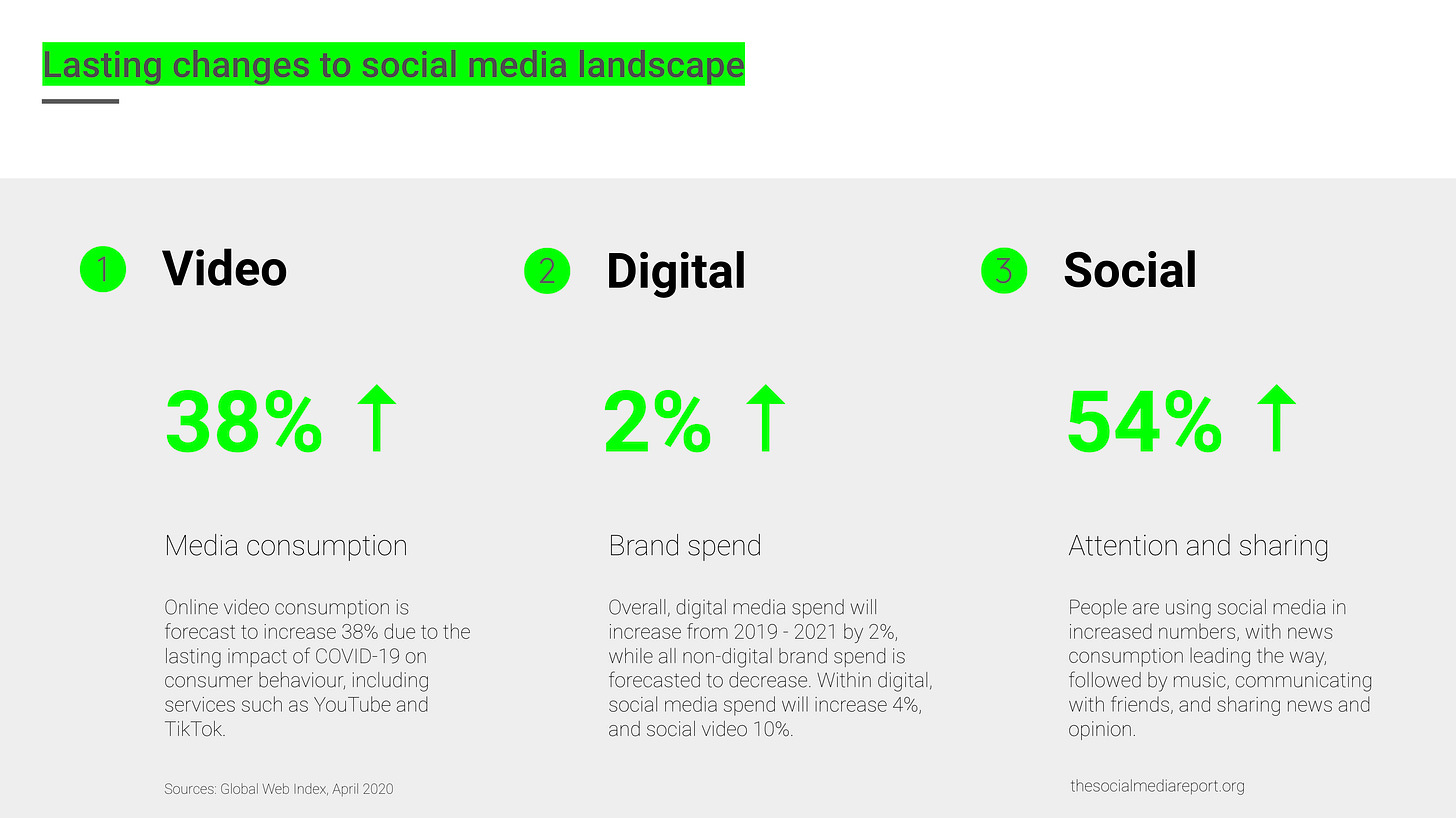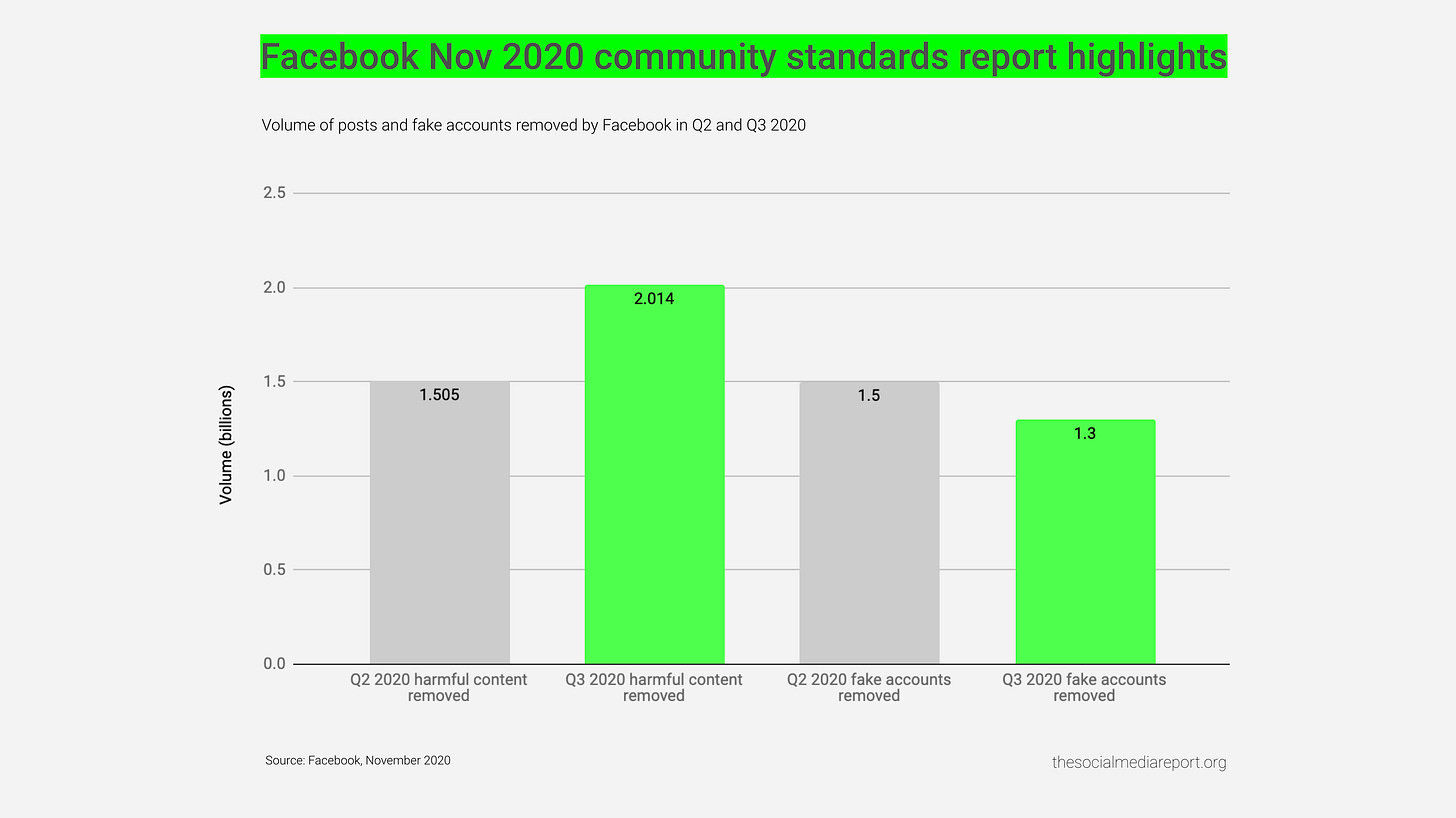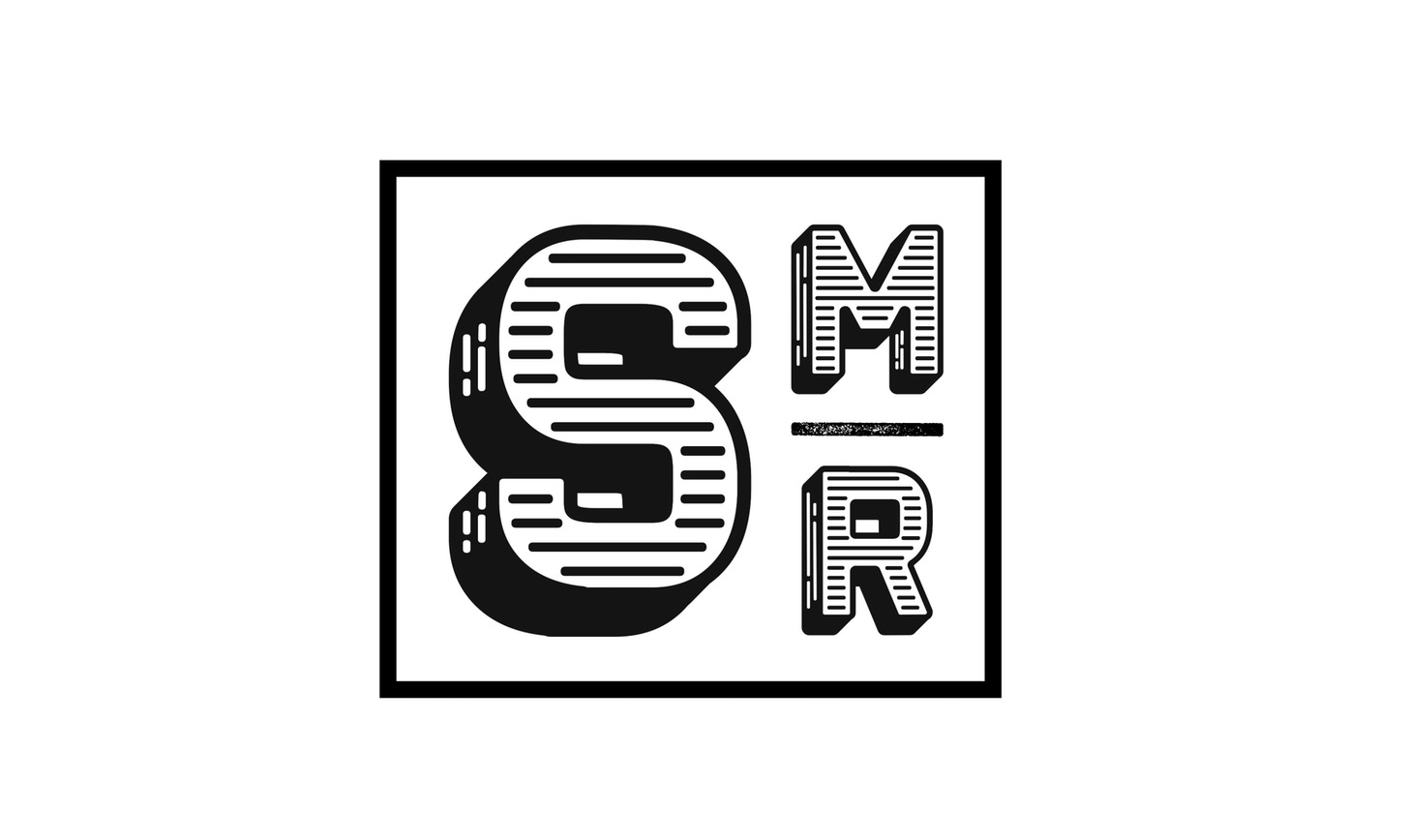The Social Media Report #7
A look at the week's news at the intersection of social media and society
Welcome to the latest edition of The Social Media Report, a review of the week’s developments in technology, digital and social media. In this edition we take a look at social media trends for the year ahead, Facebook’s latest community standards data, and a rundown of my must reads from this week.
Subscribe below if you’ve been sent this, and you’ll get every edition soon as it’s out.
The week in review
Social media trends for 2021. This week I presented a keynote at the digital marketing conference, Digital Gaggle in the UK, on trends for the year ahead in social media. This is one of a series of appearances that my colleagues and I make each year around this time, and as with most events right now, this one was all over video. Side note: it was a great event, well-attended and a slick production hosted on $2bn event platform Hopin (FT).
In the talk, which I will be delivering again soon in the coming weeks, I looked at the convergence of gaming and social networks, the impact of corporate executives on lockdown flooding social media, and the community comeback of small social, amongst other topics. If you would like an invite to one of my upcoming social media trends talks, just make sure you’re a subscriber of this newsletter and you’ll receive one.
What is probably worth sharing here from the event is what the audience was most interested in at the Q&A. The three topics resonated more than others: the changes in media consumption habits (below); the rise of audio social networks such as Clubhouse as a stand-alone and Twitter’s audio tweets; and gamer streaming by creators, such as on YouTube and Twitch.
Facebook’s new quarterly report on harmful content: on Thursday Facebook released its latest quarterly community safety report, which reveals the types of content that have required removal from Facebook and Instagram, and in what quantities. Spoiler alert - it’s VAST. To give you an idea of the volumes we’re talking about, and this is something I opened with in my TED talk that went online earlier this year, every hour of every day, on average one million harmful or fake accounts are deleted from Facebook.
Highlights from this week’s Facebook data include the company deleting 180 million pieces of election misinformation, and a total 2.01 billion pieces of harmful content on Facebook, and taking down 1.3 billion fake Facebook accounts, all between July and September 2020. Harmful content removal is up 34 per cent from the previous three months, where that number was 1.5 billion posts. The number of fake Facebook accounts taken down has decreased 13 per cent, where the previous quarter the total was 1.5 billion accounts taken down. I had to crunch the numbers to get this information, Facebook has its own summary here.
It’s important to note here that there has also been a lot of discussion this week about who moderates harmful accounts on Facebook and how. A group of 200 Facebook employees have written an open letter to CEO Mark Zuckerberg to “express dismay” at their lives being put at risk to “maintain Facebook’s profits during the pandemic.” The way in which content is moderated is a hot topic of discussion right now, and the role of AI in catching and prioritising content for actioning is one to watch. Does the above data show that AI-removed content, such as profanity that can be detected by AI, is up because of improvements in tech? Whereas the decrease in human-decided actions such as the removal of an account perhaps being down because of issues with moderation teams at Facebook? I’ll be looking at the Q4 data when it is published in January to see if it can be explained some more.
My must reads from this week
On to the most interesting stories that I have been reading this week.
YouTube, Facebook and Twitter collaborate to battle COVID disinformation: social networks join forces with fact-checkers, governments, and researchers.
Marissa Mayer's new startup Sunshine: it's focused on contact enriching.
UK announces National Cyber Force: interagency will be made up of intelligence, cyber and military experts and aims to disrupt activity by hostile states or criminals.
Twitter says it will give the @POTUS account to Biden: even if Trump doesn’t concede.
Company that runs houses which TikTok influencers live in goes public: it doesn’t *just* do TikTok houses, but “posh pads for viral videos” are hot property.
Wired Live is on 24 Nov: speakers at the virtual conference include Demis Hassabis and Brian May.
Facebook’s had a busy week
Community comeback: long read from Washington Post on the importance of the resurgence of Facebook Groups.
Vietnam threatens to ban Facebook if the social network doesn’t bow to government pressure to censor more local political content on its platform.
A single bot monger who cloned 100,000 Instagram accounts is being sued by Facebook: a Turkish national created scraping software that built then used thousands of fake Instagram accounts that would mimic actions that real, legitimate users.
256,000 FB posts removed for voter interference from Facebook’s latest safety report.
Facebook moderators express dismay: letter co-signed by 200 employees is all about working conditions.
Facebook experiments with hate speech policy in Myanmar: rules temporarily changed to prevent abuse and misinformation.
Business end
Buzzfeed acquires Huffington Post: consolidation in the world of self-publishing and listicles.
Snapchat acquires Voisey: a UK startup which lets users make music tracks with voice overlays.
The game within the game Roblox is going public: 31m daily active users, $589m annual revenue and double digit growth in engagement.
Cyber security using adtech behavioural profiling: Abnormal Security, set up by pair who sold adtech startup to Twitter, hits $500m valuation.
Andreesen Horowitz announced two funds: the amounts raised total $4.5bn, and the firm has a history of successful bets in social media and tech.
The Social Media Report is written by Drew Benvie, founder & CEO of Battenhall, The Drum, CIPR and GDXA’s social media consultancy of the year 2020.
You can follow The Social Media Report on Twitter at @TheSMReport.
Thank you for reading. If you have any suggestions for stories you can email them to db@battenhall.com.
And if you know someone that you think would like to read this newsletter, forward it on by clicking Share, below.




